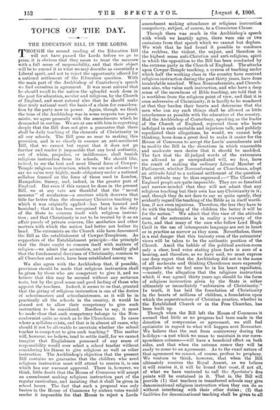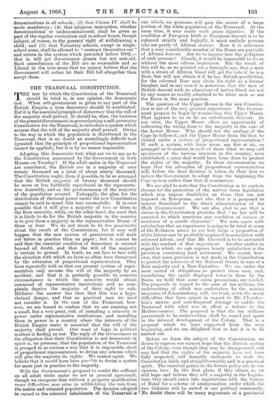TOPICS OF THE DAY
THE EDUCATION BILL IN THE LORDS. THOUGH the second reading of the Education Bill will not have passed the Lords before we go to press, it is obvious that they mean to treat the measure with a full sense of responsibility, and that their object will be to amend it in what we may describe as essentially a Liberal spirit, and not to reject the opportunity offered for a national settlement of the Education question. With the main part of the Archbishop of Canterbury's speech we find ourselves in agreement. It was most natural that he should recall to the nation the splendid work done in the past for education, secular and religious, by the Church of England, and most natural also that he should make that truly national work the basis of a claim for considera- tion by the party now in power. Again, though we think the tone of the Archbishop was in some respects too pessi- mistic, we agree generally with the amendments which he demanded in outline. We are at one with him in regretting deeply that the Bill does not give a guarantee that there shall be daily teaching of the elements of Christianity in all our schools. The Bill goes so near to making this provision, and is so clearly in essence an anti-secularist Bill, that we cannot but regret that it does not go further and render it impossible that any local authority, out of whim, prejudice, or indifference, shall banish religious instruction from its schools. We should like, indeed, to see the best and most liberal form of Cowper- Temple religious instruction, which we are not ashamed to say we value very highly, made obligatory under a national syllabus framed on the lines of those used in London, Hampshire, Surrey, and, indeed, in the greater part of England. But even if this cannot be done in the present Bill, we at any rate are thankful that the "moral monster" of secularism—a creature which deserves that title far better than the elementary Christian teaching to which it was originally applied—has been banned and banished ; that it has been recognised that it is the duty of the State to concern itself with religious instruc- tion; and that Christianity is not to be treated by it as an affair purely of private concern, like aesthetics and other matters with which the nation had better not bother its head. The extremists on the Church side have denounced the Bill as the establishment of Cowper-Templeism. As supporters of the Establishment principle—the principle that the State ought to concern itself with matters of religion—we admit the accusation, and are frankly glad that the fundamental doctrines of Christianity, common to all Churches and sects, have been established among us.
We also agree with the Archbishop that, if possible, provision should be made that religious instruction shall be given by those who are competent to give it, and we believe that this may be secured without any sectarian tests, but by the good sense and good feeling of those who appoint the teachers. Indeed, it seems to us that, granted that the giving of religious instruction is one of the duties of schoolmasters and schoolmistresses, as it will be in practically all the schools in the country, it would be absurd not to allow their competency to give such instruction to be considered. Needless to say, it must b3 made clear that such competency belongs to the Non- conformist quite as much as to the Churchman. In cases where a syllabus exists, and that is in almost all cases, why should it not be allowable to ascertain whether the school teacher is competent to give such teaching ? This matter will, however, we believe, tend to settle itself, for we cannot imagine that Englishmen possessed of any sense of responsibility would ever select a school teacher without considering his fitness to give religious as well as other instruction. The Archbishop's objection that the present Bill contains no guarantee that the children who need religious instruction most will attend to receive it, is one which has our warmest approval. There is, however, we think, little doubt that the House of Commons will accept an amendment making religious instruction part of the regular curriculum, and insisting that it shall be given in school hours. The fact that such a proposal was only beaten in the House of Commons by sixteen votes would, render it impossible for that House to reject a Lords amendment making attendance at religious instruction compulsory, subject, of course, to a Conscience Clause.
Though there was much in the Archbishop's speech with which we heartily agree, there were one or tivo, omissions from that speech which we cannot but deplore. We wish that he had found it possible to condemn, the reckless, the violent, the unjust, and therefore in the highest sense anti-Christian and anti-religious, spirit in which the opposition to the Bill has been conducted by the extreme party in the Church of •England. The attacks upon Cowper-Temple teaching, a, system of teaching under which half the working class in the country have received religious instruction during the past thirty years, have done incalculable mischief. When Nonconformists, and Church- men also, who value such instruction, and who have a deep sense of the sacredness of Bible teaching, are told that it is worthless from the religious point of view, and that it is even subversive of Christianity, it is hardly to be wondered at that they harden their hearts and determine that the men who can say such things shall be allowed as little interference as possible with the education of the country. Had the Archbishop of Canterbury, speaking as the leader of the Church of England, reproved those who have indulged in such excitable and injurious talk, and publicly repudiated their allegations, he would, we cannot help thinking, have done a great deal to make it easier for the House of Commons to accept the Lords' amendments and to modify the Bill in the directions in which reasonable and moderate men desire that it should be modified. The fact that the ill-judged words of the extremists are allowed to go unrepudiated will, we fear, have the result of making the ordinary Liberal Member of Parliament, whether Nonconformist or Churchman, adopt an attitude fatal to a national settlement of the question. That attitude may be thus expressed :—" The Church of England people are quite impossible. They are so fanatical and narrow-minded that they will not admit that any a teaching but their own has any Christianity in it ; and, though they do not dare to say so quite openly, they evidently regard the teaching of the Bible as in itself worth- less, if not even injurious. °Therefore, the less they have to do with the teaching of the children the better it will be for the nation." We admit that this view of the attitude even of the extremists is in reality a travesty of the facts, and that many of the men who follow Lord Hugh Cecil in the use of intemperate language are not in heart or in practice as narrow as they seem. Nevertheless, there is a real danger that this travesty even of the extremists' views will be taken to be the authentic position of the Church. Amid the babble of the political auction-room only a clear, loud voice stating plain facts is sure of a hearing, and therefore, as we have said, we must express our deep regret that the Archbishop did not in the name of all moderate and thinkine. Churchmen more expressly repudiate what we feel sure be in his heart repudiates, —namely, the allegation that the a instruction which it was agreed thirty years ago should be the form of religious instruction given by the State is either ultimately or immediately "subversive of Christianity." In truth, it has laid the foundation of Christianity in the hearts of millions of children, a foundation upon which the superstructure of Christian practice, whether in the Established Church or in the Free Churches, has been built up.
Though when the Bill left the House of Commons it seemed that little or no progress had been made in the direction of compromise or agreement, we still feel optimistic in regard to what will happen next November. We believe that the rest from controversy during the holidays—a rest which we mean to maintain in our corre- spondence columns—will have a beneficial effect on both sides, and that when the autumn comes they will be ready to come to an agreement. As to the exact nature of that agreement we cannot, of course, profess to prophesy. We venture to think, however, that when the Bill ultimately receives the Royal Assent, as we believe it will receive it, it will be found that most, if not all, of what we have ventured to call the Spectator's five points will be contained in it. That is, the Bill will provide (1) that teachers in transferred schools may give denominational religious instruction when they can do so without interfering with their other duties ; (2) that facilities for denominational teaching shall be given to all denominations in all schools ; (3) that Clause IV. shall be made mandatory ; (4) that religious instruction, whether denominational or undenominational, shall be given as part of the regular curriculum and in school hours, though subject, of course, to the parents' right of withdrawing a child; and (5) that Voluntary schools, except in single- school areas, shall be allowed to "contract themselves out" and return to the system which prevailed before 1902,— that is, will get Government grants but not rate-aid. Such amendments of the Bill are so reasonable and so Liberal in the true sense that we cannot believe that the Government will rather let their Bill fall altogether than accept them.







































 Previous page
Previous page